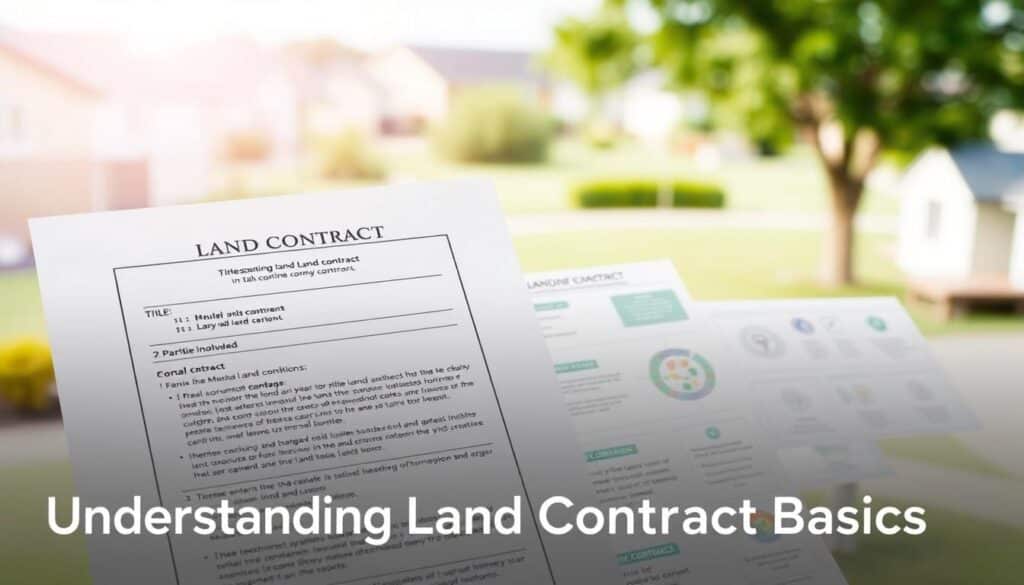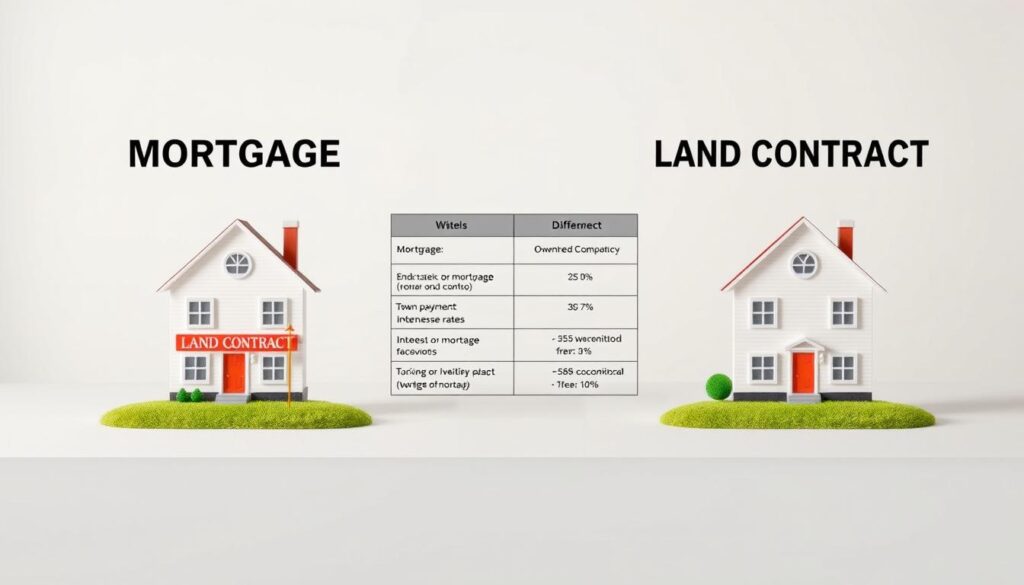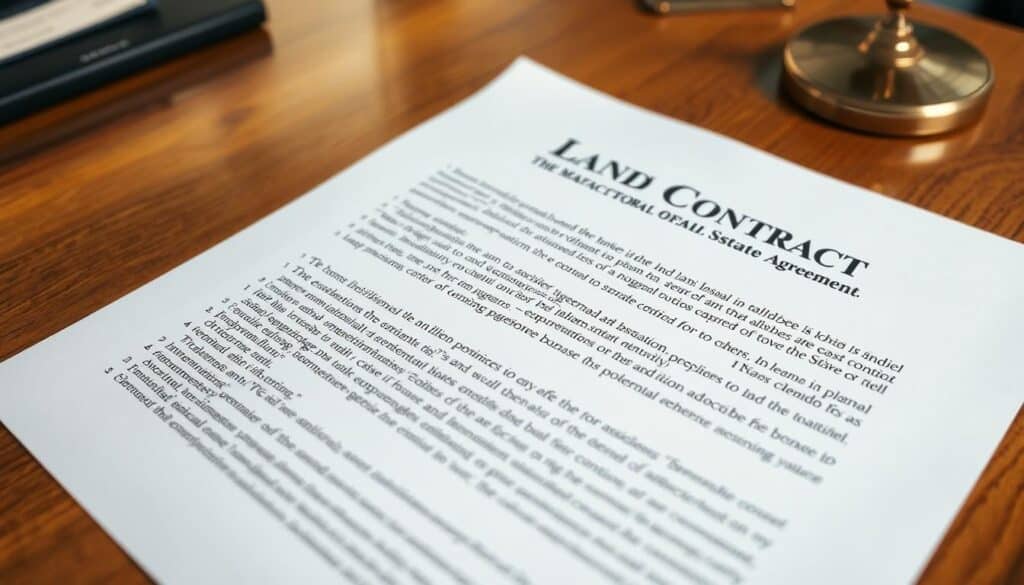A land contract is a way to buy property without a traditional mortgage. It lets buyers and sellers make their own financing deals. This is great for people who can’t get a mortgage through banks.
This agreement is a special kind of real estate deal. The seller pays for the property, unlike a mortgage where a bank does. It’s more flexible, helping buyers who can’t meet bank standards.
In St. George, Utah, Whetzel Homes Collective helps clients with these deals. They know a lot about land contracts. Buyers can use this option for homes, businesses, or empty land.
Key Takeaways
- Land contracts provide alternative financing for property purchases
- Sellers act as direct lenders in these agreements
- Suitable for buyers with limited credit history
- Offers more flexible purchasing options
- Requires careful legal and financial understanding
Understanding Land Contract Basics
Land contracts are a different way to buy real estate. They are flexible for those who can’t get a mortgage easily. A land contract lets buyers buy property directly from sellers, skipping banks.

These contracts have special terms that help buyers own property in installments. This is great for people with complex financial situations.
Core Purpose of Land Contracts
Land contracts have several key roles in real estate:
- They help buyers with bad credit own property.
- They make buying faster than traditional mortgages.
- They offer flexible financing options.
- They provide different ways to buy property.
Key Contract Components
A good land contract has important parts like:
- A clear description of the property.
- The agreed-upon price.
- How and when payments will be made.
- The interest rate.
- What happens if the buyer defaults.
Legal Framework Insights
It’s important to know the law about land contracts. Buyers should know they don’t own the property until they meet all contract terms. This means both sides need to understand the contract well and might need a lawyer.
Land contracts offer a new way to buy property, filling gaps in traditional financing.
How Land Contracts Differ from Traditional Mortgages

Real estate financing has two main paths: land contracts and traditional mortgages. Both help buyers get property, but they work differently.
Land contracts are great for buyers who can’t get a mortgage. They offer flexible financing, even for those with bad credit. The main differences are:
- Negotiation flexibility in contract terms
- Less stringent credit requirements
- Potential for alternative payment structures
- Faster closing processes
Traditional mortgages are more set in their ways. Buyers usually need:
- Credit scores of 620 or higher
- Down payments between 10-20%
- Extensive documentation
- Longer approval processes
Interest rates are another big difference. Land contracts often have higher rates because of less regulation. Mortgages usually have fixed or adjustable rates.
Land contracts also come with a big risk: balloon payments. Buyers might have to pay a large amount at the end. This can be tough for those not ready.
Knowing these differences helps buyers pick the best financing for them.
What is a Land Contract
A land contract is a special way to buy real estate, different from getting a mortgage. It lets buyers directly deal with sellers, making it easier to own property.

It’s important for buyers and sellers to know the details of a land contract. These deals have their own rules and terms, unlike regular property sales.
Contract Structure and Key Components
A land contract has key parts:
- Detailed purchase price breakdown
- Specific payment schedules
- Interest rate specifications
- Timeline for property transfer
Payment Arrangements
How payments are made in land contracts can change a lot. Buyers usually start with a 20% down payment. Then, they make regular payments. Many contracts require a big payment at the end.
“Land contracts offer a creative financing solution for buyers who might struggle with traditional mortgage requirements.” – Real Estate Expert
Property Rights Distribution
Land contracts handle property rights in a special way. The seller keeps the legal title until the buyer pays off the contract. The buyer gets to use the property and has rights to it. This setup protects the seller and helps the buyer own the property.
- Seller maintains legal title
- Buyer receives equitable interest
- Full ownership transfers upon complete payment
It’s wise to talk to a real estate lawyer to understand land contract terms. They can help make sure the agreement is fair and legal.
Benefits of Land Contract Agreements

Land contracts offer unique benefits for both buyers and sellers in the real estate market. They provide flexibility that traditional mortgages can’t match. Knowing the pros and cons of land contracts helps buyers and sellers make smart choices.
For buyers with tough credit, land contracts are a way to own a home. The benefits for buyers include:
- Easier qualification process compared to traditional bank loans
- Faster transaction completion
- Lower initial transaction costs
- Direct negotiation with the property seller
- Potential for more flexible payment terms
Sellers gain from land contracts in several ways. These agreements can help sell properties more quickly and offer a steady income. The benefits for sellers include:
- Higher selling price
- Consistent monthly income
- Ability to retain property title until full payment
- Potential tax advantages
While land contracts are appealing, buyers must weigh the pros and cons carefully. Risks like losing the property for missed payments and complex legal rules need careful thought and expert advice.
Land contracts represent an innovative approach to real estate transactions, bridging gaps in traditional financing methods.
Potential buyers should talk to legal and financial experts. They can understand the specific implications of land contracts in their state and financial situation.
Traditional vs Wraparound Land Contracts
Understanding the differences between traditional and wraparound land contracts is key. These options offer unique chances for buyers and sellers in real estate. They are part of owner financing land contract strategies.

Land contracts help people own property who can’t get traditional mortgages. These methods change how property rights and ownership work.
Comparing Contract Structures
In a traditional land contract, the seller owns the property until the buyer pays it off. Key points are:
- Seller keeps legal title until payment is complete
- Buyer has equitable title while paying
- Ownership rights are limited
- Usually needs a big payment at the end
Exploring Wraparound Land Contracts
Wraparound land contracts give buyers ownership sooner. Key features are:
- Buyer gets a warranty deed right away
- Seller keeps paying the mortgage
- Buyer pays the seller directly
- Can own property immediately
Selecting the Right Option
Choosing between traditional and wraparound contracts depends on your finances. Buyers should think about:
- What your credit score is
- If you can make a down payment
- Your long-term goals
- How much risk you’re willing to take
About 35% of land contract buyers have low credit scores. This makes these options great for those who can’t get traditional mortgages.
Legal Requirements and Documentation
Understanding land contract requirements is key. You need to know about legal documents and state laws. These agreements are great for buyers and sellers who can’t get traditional loans.
Land contracts have important legal parts:
- Comprehensive written documentation detailing purchase terms
- Clear specification of total purchase price
- Explicit interest rate and payment schedule
- Conditions for default and possible property loss
Thirteen states require public recording of land contracts. This makes the deal more transparent and protects both sides. It creates a public record of the sale.
The documents must cover:
- Total purchase price
- Down payment amount
- Interest rate structure
- Payment penalties
- Default consequences
Buyers should read all the contract details. This helps them know their rights and risks. Getting legal advice is also a good idea. It helps understand complex terms and follow local laws.
Land contracts differ a lot by state. Some states protect buyers more, while others favor sellers. Knowing these differences is vital for smart real estate choices.
Understanding Property Title Rights
Buying land on contract is different from regular real estate deals. It involves unique title rights that buyers need to understand well.

When you buy land on contract, the title is key. The seller keeps the legal title until you pay off the contract. You get an equitable title, which means you can own the land once you meet the contract’s terms.
Title Transfer Process
The title transfer process in land contracts has a few important steps:
- Initial contract signing
- Buyer receives equitable title
- Continued monthly payments
- Final payment triggers legal title transfer
Legal Ownership Considerations
Land contracts have their own set of legal rules. Buyers get some rights, but the seller keeps the title until the contract is paid off.
| Buyer Rights | Seller Rights |
|---|---|
| Occupy the property | Retain legal title |
| Make improvements | Reclaim property if default occurs |
| Build equity | Negotiate contract terms |
Before buying land on contract, do a title search and think about title insurance. It helps protect your rights and makes sure you can own the land fully.
Payment Structure and Interest Rates
Land contracts have their own payment structures and interest rates. They are different from traditional mortgages. These contracts offer flexible financing options between buyers and sellers.
Payment plans in land contracts vary a lot. Buyers usually face several payment models:
- Monthly installment payments
- Balloon payment structures
- Adjustable interest rate options
The interest rates in land contracts are set by the seller. These rates are often higher than regular mortgage rates. This is because the seller takes on more risk. Interest rates can be between 8% to 11%, depending on the state and negotiations.
Buyers need to think about a few things:
- Negotiating good interest rates
- Understanding the long-term financial effects
- Looking at balloon payment needs
Most land contracts have acceleration clauses. These clauses let sellers ask for the whole balance if a payment is missed. This shows how important it is to plan finances well and make payments on time.
It’s wise for buyers to talk to a real estate attorney. They can help understand the contract’s terms. This advice can help both sides in these unique financing deals.
Seller Responsibilities in Land Contracts
Sellers have key roles in land contract agreements. They must protect both parties’ interests. Their duties go beyond just selling the property. They must handle legal and maintenance tasks too.
Sellers in land contracts face big legal and practical duties. They need to be careful:
- Maintain property in habitable condition
- Provide clear property title
- Disclose all known property defects
- Comply with local and state real estate regulations
Property Maintenance Obligations
Sellers must keep the property in good shape during the contract. Virginia is unique because it has strict rules for land contract properties. Sellers should:
- Fix major structural problems
- Make sure utilities work
- Keep safety standards
- Stop property from getting worse
Legal Compliance Requirements
Understanding legal rules for land contracts is important. Each state has its own rules. For example, Ohio has clear rules for both sellers and buyers.
Proper documentation and clear communication are essential for land contract deals.
Sellers should be ready for challenges. Foreclosure can be slow and hard. Knowing state rules helps avoid problems and makes deals smoother.
Buyer Obligations and Rights
Buying land on contract is different from regular real estate deals. It comes with its own set of rules and rights. Buyers need to know their duties to keep their investment safe and handle the unique financing options.
When you buy land on contract, you take on several important tasks:
- Maintaining the property in good condition
- Paying property taxes on time
- Carrying appropriate property insurance
- Making regular contract payments
- Understanding the specific terms of the agreement
It’s vital for buyers to read their land contract carefully. Legal protections vary by state, so local regulations play a critical role in defining buyer safeguards.
| Buyer Right | Description |
|---|---|
| Fair Contract Terms | Protection against predatory clauses |
| Property Disclosure | Complete information about property condition |
| Equity Accumulation | Understanding payment application |
| Default Protection | Right to cure payment defaults |
About 25% of land contract buyers face big property maintenance issues. This shows how key it is to inspect the property well and know about any needed repairs before signing.
For those looking into land contracts, being financially ready is key. This means having an emergency fund, knowing about possible big payments, and planning for refinancing.
Understanding Default Procedures

Understanding land contract requirements is key. If buyers can’t meet their obligations, serious problems can happen fast.
Land contracts are different from regular mortgages when it comes to defaults. Buyers facing money troubles might face harsher penalties than with mortgages.
Default Resolution Mechanisms
The default process in land contracts has several important steps:
- Immediate notice of missed payments
- A short time to catch up on payments
- The seller can take back the property
- Little chance to fix the default status
Legal Remedies and Consequences
Buyers facing default need to know their rights. Important points include:
- Rapid Eviction Possible: Sellers can take back the property quickly, unlike with foreclosures
- Loss of Equity: Buyers might lose all payments made
- Credit Score Damage: Default can hurt credit scores a lot
- Responsibility for Remaining Balance
Land contract defaults vary by state because of lack of rules. Buyers must check their contracts and know local laws to protect themselves.
Doing thorough research and getting legal advice is vital before signing a land contract.
Property Insurance and Tax Considerations

Understanding property insurance and taxes is key when dealing with land contracts. Buyers usually pay for property taxes and insurance. This can greatly affect their housing costs.
When you enter a land contract, you need to think about several financial points:
- Property Tax Obligations
- Insurance Coverage Requirements
- Potential Tax Deductions
- Record-Keeping Necessities
Recent studies show that 73% of land contract homebuyers pay for property taxes. These taxes can add thousands to your yearly housing costs. This can be a big challenge for your financial planning.
Tax reporting is very important in land contract deals. Sellers must report any income, like interest from payments. Buyers might get tax breaks, like for business use or income-generating properties.
Keeping accurate records of payments and expenses is vital for tax compliance and protecting both sides.
Insurance is also a big deal. Buyers should look into:
- Title insurance coverage
- Property damage protection
- Liability coverage
- Potential environmental risk policies
Choosing the right insurance and understanding taxes can help you make smart choices in land contracts. Getting advice from a tax expert and real estate professional can offer tailored advice for your situation.
Risk Factors for Buyers and Sellers
Land contracts come with unique challenges for both buyers and sellers. It’s important to know the pros and cons to make smart choices and protect your money.

Land contracts involve big financial and legal risks. It’s key to navigate these carefully. Recent data shows some surprising facts about these agreements.
Common Pitfalls to Avoid
- Lack of Professional Verification: Almost 50% of buyers skip home inspections. This leaves them open to property condition risks.
- Incomplete Documentation: 8% of people didn’t get a written contract. This makes them legally vulnerable.
- Unclear Property Ownership: The seller keeps legal ownership until paid in full. This can make future sales tricky.
- Financial Unpredictability: About 60% of contracts have balloon payments. This can be financially tough.
Protection Strategies
- Do thorough property inspections
- Get professional legal advice
- Make sure all contract terms are in writing
- Know all your financial responsibilities
Statistically, about 30% of buyers might not make their payments. This highlights the need to weigh the pros and cons before agreeing to a land contract.
Buyers should be careful and seek expert advice to avoid risks.
Important steps to reduce risks include detailed documentation, knowing all financial aspects, and talking to experienced real estate lawyers. They should know about alternative financing options.
Converting Land Contracts to Traditional Mortgages
Switching from a land contract to a traditional mortgage is a big step for property buyers. It lets them get financing terms that are more standard and might lower their interest rates over time. Knowing how to convert can help buyers make smart choices about their real estate.
The steps to change from a land contract to a mortgage are important:
- Get a detailed property appraisal
- Find a good mortgage lender
- Check if you qualify financially
- Talk terms with the seller
Land contracts might seem good for buyers with bad credit at first. About 1.4 million Americans used land contracts in 2021. But, buyers can switch to a mortgage when they improve their finances and meet mortgage requirements.
Important things to think about during the switch include:
- Check the current property value
- Look at the land contract terms
- Get ready your financial documents
- Know about refinancing costs
Getting the conversion right needs clear talks with the seller and showing you’re financially stable. In 2022, only 8% of land contract sellers followed Truth in Lending Act (TILA) rules. This shows why it’s key to do your homework and get expert help during the change.
Buyers should see converting a land contract to a mortgage as a smart financial move. They should think carefully about their long-term plans for owning a home.
Working with Whetzel Homes Collective in St. George
Dealing with land contract homes can be tricky. Whetzel Homes Collective in St. George, Utah, is a top choice. They help both buyers and sellers with their land contract needs.
They offer a mix of local market know-how and personal advice. People in St. George can use their experience to:
- Understand local real estate rules
- Find flexible land contract options
- Get support with property deals
- Get deep market insights
Expertise meets opportunity in the vibrant St. George real estate landscape. Whetzel Homes Collective knows a lot about land contract homes. They help clients make choices that fit their financial plans.
“Our mission is to simplify complex real estate transactions and create pathways to homeownership,” says the Whetzel Homes Collective team.
Want to talk to Whetzel Homes Collective? Here’s how to reach them:
- Location: St. George, Utah
- Phone: (435) 334-1544
Looking into land contract homes or real estate investments? Whetzel Homes Collective is here to help. They offer local expertise and professional support for your journey.
Understanding Land Contracts: Key Takeaways and Final Thoughts
Understanding a land contract is key. It involves looking at both the good and bad sides. These agreements can help buyers with credit issues, but they need careful thought and planning.
Land contracts help people with bad credit buy homes. About 40% of buyers with credit problems use this method. It’s a way for many Americans to own property.
Getting help from experts is important when dealing with land contracts. Buyers should talk to real estate lawyers and check the contract details. They need to know the legal and financial aspects well.
Success with land contracts comes from making smart choices and clear communication. Whetzel Homes Collective in St. George is ready to help with this complex process.
